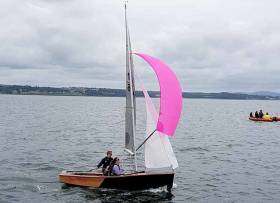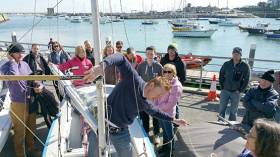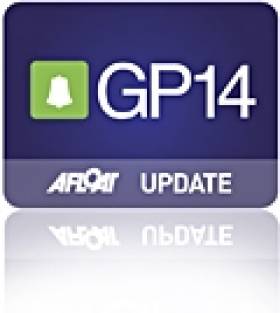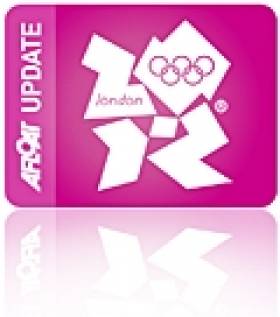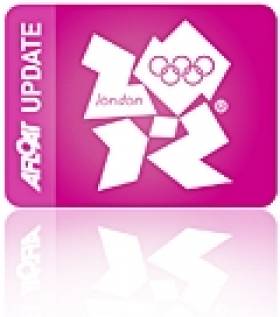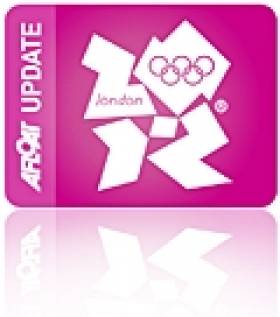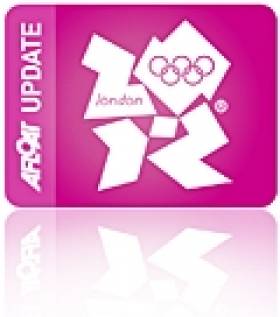Displaying items by tag: Ger Owens
Ger Owens (Dun Laoghaire) & Mel Morris (East Antrim) are Sailors of the Month for October
So many factors came into play for the 75th Anniversary of the Champions’ Cup (aka the Helmsman’s Championship or the All-Ireland) in GP 14s at Sutton Dinghy Club on October 8th/9th that its weather-imposed compression into a one-day series made for a very intense mix. It went right to the wire, but defending champion Ger Owens of the Royal St. George Yacht Club (who won in National 18s in Crosshaven in 2021).
His regular GP14 partner Mel Morris of East Antrim Boat Club (her father Curly Morris of East Antrim BC won in 1967) moved smoothly into their dynamic duo routine.
As the sun set on a deceptively gentle evening which was the calm before the storm, the salver that now thinks it’s a cup was theirs for the taking.
Even in a pandemic-shortened season like 2021, by the time October is reached, some Afloat.ie "Sailor of the Month" award winners from earlier months are achieving further success. At year's end, these new successes are gathered in with their earlier achievements to add further lustre to their previous winning profiles in order to intensify the process of selecting a "Sailor of the Year". Meanwhile, as each month comes round, this approach clears the way for fresh names to come to the fore, and in October 2021's special circumstances, our latest listing of "Sailors of the Month" reflects this.
 In for the long haul - the multi-talented Ger Owens Photo: Bob Bateman
In for the long haul - the multi-talented Ger Owens Photo: Bob Bateman
Ger Owens of Royal St George YC is "Sailor of the Month" for October
While some helms have won the All-Ireland Championship two or even three times within a relatively short time-span, none can match Ger Owens' unique achievement of having a 21-year-gap between his two victories. He was a rising star when he first took it in 2000, having won the Juniors in 1996 & 1998. And with today's greatly increased longevity, he still is a rising star. Most of his achievements in recent years have been in the GP 14s, but he has proven more than able in several classes Thus when the All-Ireland 2021 was staged in National 18s in Crosshaven at the beginning of October, he was soon at home in the class, taking the overall win in the Championship of Champions despite a trio of longtime National 18 sailors being in the lineup against him.
Ger Owens & Mel Morris Hold Nerve to Win Irish GP14 Nationals
The 2017 GP14 Irish Nationals were held on 19th-21st August at Ballyholme Yacht Club. 29 boats competed which included one visiting team from the UK – John Hayes, an ex 470 campaigner from Southport who was sailing with Joel James. Overall numbers were down a bit on previous years due to a number of mitigating factors. However those unable to attend missed a superb event with a wide range of conditions, superb race management, excellent hospitality and exceptionally close racing.
Chief measurer Jimmy McKee was in attendance on Friday night & Saturday morning to scrutineer and weigh boats. The forecast for Saturday was borderline and the fleet were held ashore initially for an hour or so to allow the wind to subside. When the fleet did eventually take to the water, the lull in conditions proved to be only temporary. Shortly after the start of race one, the committee boat began recording gusts of 30 knots. The ensuing white knuckle race saw Shane MacCarthy & Damian Bracken winning from Sligo’s Niall Henry & Ossian Geraghty with Sutton sailors Alan Blay & David Johnston 3rd. With only 15 boats finishing and conditions refusing to abate, the race committee made the sensible decision to send the fleet home after a single race. Once ashore competitors enjoyed a superb bar-b-que where the famous Ballyholme rib-eye steaks lived up to all of the pre–event hype.
The forecast for the second day of racing could not have been more different to the first. This time, conditions looked borderline on the light side, with even the most optimistic forecasts predicting gusts of just 7 knots. Nevertheless, with a race to make up the race committee sent the fleet out and after a hour or so floating around the breeze did eventually appear. Niall & Ossain took first blood in the challenging conditions winning the opening race from English visitors John Hayes & Joel James. The right hand side of the beats seemed to be consistently paying in the ebbing tide but getting out there through the various holes & shifts was’t completely straightforward! Ger Owens & Melanie Morris found a way though, knocking in 2 bullets in race 3 and 4 from Alan Blay & David Johnsson and Keith Louden & Alan Thompson respectively. Silver fleet sailors Doire Shiels & Andrew Sexton also had a good day, recording a 7th and a 3rd to take control of the silver fleet. After a long day on the water, the race committee decided the fleet had had enough after 3 races and the fleet returned home.
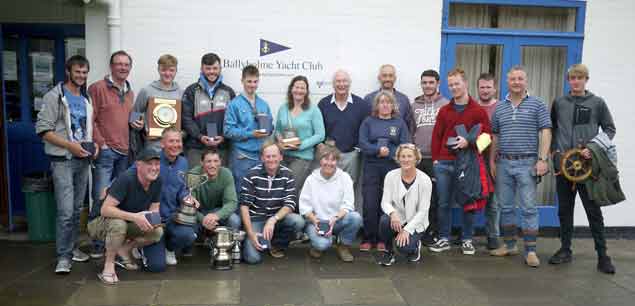 2017 GP14 Prize Winners at Ballyholme Yacht Club
2017 GP14 Prize Winners at Ballyholme Yacht Club
The Irish GP14 AGM was held on Sunday evening and saw Stephen Boyle step down after 3 years as class president. David Cooke takes over as the new president and no doubt will strive to continue the excellent progress made over the past few years as the class builds towards a 2020 World Championships in his home club. Following the AGM, many of the sailors gathered in the nearby Jamaica Inn with a surprise birthday cake for class stalwart Hugh Gill who is celebrating another big one!
With 3 races scheduled for the final days sailing, and just 2 points separating the top four boats the championship was wide open. Race 5 saw Shane & Damien record their second race win from John & Joel. Race 6 and another race winner, this time John & Joel taking line honours with Keith Louden & Alan Thompson in second position. So going into the final race the championship was set for one of the closest finishes in recent years with Ger & Mel holding a narrow one point lead but Shane & Damian, John & Joel and Nial & Ossian all still in with a real chance of overall victory.
In the end however, Ger & Mel held held their nerve and won the last race and with it, the overall event. Doire Shiels & Andrew Sexton won the Silver fleet finishing in 10th overall while Sutton’s Shane MacLoughlin & Rory Murdoch won the bronze fleet. Top youths were Gareth & Richard Gallagher in 12th position overall.
Fireball Training Session with Ger Owens
Last weekend saw ten boats and some 25 Fireball participants join the ISA supported training session with former Olympic 470 sailor Ger Owens at the DMYC. Ger had a hard act to follow as previous Fireball training sessions had been led by Fireball World champions including Adam Bowers, Simon Potts and Richard Wagstaff. That said he rose magnificently to the occasion and his brilliantly self-depreciating and quite funny delivery charmed and informed the fleet. Ger’s main message to the sailors was that while boat and crew techniques were certainly important and worth perfecting through training the biggest gains were to be had through intelligent tactics and strategy. Something as simple as always keeping the main opposition in a large fleet under your boom would ensure high average results, offer occasional race wins and improve the chances of a very good result over a series. While that advice might seem blindingly obvious how many of us sail off to the corner of a course seeking miracles, time after time, only to find ourselves well down the fleet at the finish?
Having delivered some big truths, in a very steady and digestible patter of advice, Ger sent the fleet afloat for a fitness test with 50 “loopies” round a fixed mark, in both directions, whilst swapping hands throughout. This was followed by short circuit training with a single mark, beats, bear-aways, hoist on reach, drop downwind, gybe, reach, drop, beat again, all in the shortest possible distance. Ger then set quick short upwind races to put the “under the boom” principle into practice, and downwind legs to test kite hoist, gybes and drops under pressure. These exercises are designed like gym sessions to improve fitness, technique and ultimately train the right “muscle memory” to kick in under pressure while racing. Emphasis is placed on going out for short, sharp training sessions for just one hour, a bit like a gym session.
Many other topics followed over the two day session, too many to list here, with a constant stream of tips and advice. This allowed all participants to get something out of the sessions, from the most experienced and seasoned campaigners to new Fireballers. Commenting on the sessions one of the top helms Noel Butler felt there was plenty to learn from an Olympic sailor who had campaigned a boat with similar performance to the Fireball, with useful and simple drills to perfect techniques. He enjoyed the affable, positive, and engaging presentation style. New Fireballer Tim Crowe thought Saturday in particular (when the winds were a brisk north westerly) was a great day on the water with engaging exercises. Sunday saw lighter winds for a time and for the hour or so when the wind died completely the combined ingenuity of trainer and class saw the group invent a device comprising a pole, mobile phone and go-pro camera to trawl the harbour at low tide in a search for a spinnaker pole lost overboard on Saturday. While that exercise was unsuccessful the weekend overall was a huge success and whetted the appetite for events on the horizon. The first regional event of the season sees the class visit RNIYC for their Ulster championships in just 4 weeks. And for anyone interested in getting involved in one of Ireland’s most exciting dinghies the class is keen to attract more newcomers and will be running introductory sessions in the boats over some weekends in May and June at the DMYC.
Ger Owens & Scott Flanigan - 470 Class
Youth and experience combined to crew Ireland's 470 trapeze dinghy in Weymouth. Double Olympian in the 470 class (Beijing 2008 and Athens 2004)and winner of two races at the Olympics in China, many would have expected Ger Owens of Dun Laoghaire to have qualified earlier for London but less than a year ago, his new crew Scott Flanigan of Howth was preparing to sit his Leaving Certificate.
After taking one of the last seven places at the Barcelona World championships in May this has been a last minute campaign that has paid off.
The London Olympics was a step that moved Flanigan from being an ISAF youth sailor in 2010 to Olympic 470 crew aged just 20.
Name: Ger Owens
Hometown: Dun Laoghaire, Co. Dublin
Club: Royal St. George Yacht Club
Age: 33
Discipline: 470 dinghy (helm)
World Ranking: 66th (May 2012)
Name: Scott Flanigan
Hometown: Howth, Co. Dublin
Club: Howth Yacht Club/ Royal St. George Yacht Club
Age: 20
Discipline: 470 dinghy (crew)
World Ranking: 66th (May 2012)
Olympic Sailor Leads Irish Hopes at GP14 Worlds in Cornwall
#gp14 – Triple Irish Olympic sailor Ger Owens crewed by Melanie Morris lies fifth overall at the GP14 World championships in Cornwall after three races sailed in the 127-boat fleet.
Owens and Morris have moved up two places after Monday's two races scoring tow fifth places to be on the same 17 points as the UK's Simon Potts and Peter Grey of Blithfiled SC.
A south westerly force 3 in Looes Bay combined with big rolling waves for yesterday's racing.
Irish interest in the top ten is high with Former Mirror world Champion Ross Kearney and Ed Bradburn from Royal North of Ireland Yacht Club ninth and Greystones sailor Shane McCarthy and Andy Thompson tenth.
Master builder Alistair Duffin and Paul Whitcombe from Newtownards are 17th in the massive fleet.
More on the worlds site here.
#470 – Ireland will be sending a five boat team (and that may yet rise to six) to the London Olympics following the qualification of Ger Owens for his third Olympic regatta in the 470 dinghy with new Howth crew Scott Flanigan.
As Afloat.ie previously reported this week the pair are currently sailing at the 470 World Championships in Barcelona where the final seven nation places are up for grabs in addition to the 20 that were allocated in 2011. The Dublin duo currently lie 24th overall on Day 3 following a 10th and a 13th in their two races today. The 95 boats have now split into gold, silver and bronze fleets. Owens and Flanigan are in the gold fleet and with the guarantee that they cannot fall lower than the 7th required nation thus securing their place in the Games.
Worrall Thompson Thanks Irish Wife at Fundraiser for 470 Duo
#WORRALL THOMPSON - Celebrity chef Anthony Worrall Thompson - in Dublin at the weekend for a fundraiser for Olympic hopefuls Ger Owens and Scott Flanigan - has credited his Irish wife with being the "rock" that kept him going through his recent shoplifing controversy.
"She is absolutely amazing," he told the Irish Independent of his Dublin-born wife Jacinta Shiel. "We met nearly 20 years ago. She's gorgeous, she's got a great heart and she's my rock."
Worrall Thompson was at Malahide Rugby Club on Saturday to judge a celebrity chef night in aid of the Olympic 470 duo's bid for a spot at the 2012 games, as previously reported on Afloat.ie.
He kept his promise to attend the event following last Monday's public apology for his "stupid and irresponsible actions" after he was caught shoplifting cheese and wine from a Tesco store.
Worrall Thompson also donated his appearance fee from RTÉ's Saturday Night Show to Owens and Flanigan, who require sponsorship to supplement their support their funding from the Irish Saling Association.
#WORRAL THOMPSON – Mischievous spoofers have taken to YouTube to poke fun at Anthony Worrall Thompson who appears at Malahide Rugby Club this Saturday on Olympic sailing fundraising duty for Irish pair Scott Flanigan and Ger Owens. The Ready Steady Cook star shamed for his Tesco shoplifting this week is judging a celebrity Chef night in aid of the Olympic 470 trialists at the North Dublin venue.
The TV star has apologised for his "stupid and irresponsible actions" on Monday after he was caught shoplifting cheese and wine from a Tesco store.
The Irish Olympic duo have organised two teams for the Cook in. One team with sports personalities and the second team with entertainment and political personalities. Worrall Thompson will be presiding as judge of the Malahide competition.
He was arrested at the supermarket in Henley on Thames, London after failing to pay for items at the self-service checkouts five times in 16 days.
In one comical clip that appears on youtube, a shopkeeper pokes fun at the troubled presenter in a tongue-in-cheek foul-mouthed rant.
Another spoof video superimposes Worrall Thompson's head onto footage of another shoplifter being apprehended instore.
For Saturday night, the Olympic duo have organised two teams for the Cook in. One team with sports personalities and the second team with entertainment and political personalities.
There will be four on each team and they will have a choice of preparing dishes with either beef or salmon.
'We hope that Anthony will be the judge and sample the finished dishes giving marks out of ten' say the Olypmic pair.
The event will be filmed live from the kitchen and streamed onto the big screen in the function room for guests to view.
Following his arrest, the 60-year-old released a statement claiming he intends to "seek the treatment that is clearly needed".
He added: "I am not the first, and I certainly won't be the last person to do something without rhyme or reason - what went through my head, only time will tell.
"Of course, I must also apologise sincerely to Tesco, with whom I'm had a long and genuine working relationship, and to all the staff at the Henley branch, many of whom I've got to know over the years.
"Once again, I am so sorry and hopefully in the future I can make amends."
Tickets for Saturday night's event are €100 or €1000 for a table of ten. There is Live music on the night and an auction with Denis Drum including the following items: Signed Munster Rugby Jersey, Signed Leinster Rugby Jersey, Signed Irish Rugby Jersey, Grand Slam Rugby tie donated by Ollie Campbell, Signed Irish Soccer Jersey, Four ball with Philip Walton, A painting by Alan Kenny. Contact 01 8453459 for bookings. Cheques made payable to Ger Owens.
Ireland is on the entry list in six classes for the Weymouth and Portland International Sailing Regatta 2011, the London 2012 Olympic Test Event, that has been finalised today.
Ireland's leading hopes for a top result is in the Radial class where Annalise Murphy took bronze at the Sail for Gold regatta at the same venue. There's also high chances in the Star class with Peter O'Leary and David Burrows. Also sailing for Ireland is James Espey is in the Laser, Ross Hamilton in the Finn, Ger Owens and Scott Flannigan in the 470, Ryan Seaton and Matt McGovern in the 49er. A full entry list is available for download at the end of this post.
Sixty six nations have submitted the names of the 460 sailors who will test the conditions at Weymouth and Portland one year ahead of the London 2012 Olympic Sailing Competition.
For many of Member National Authorities there has been a selection headache with nations following game time rules where only one athlete per event is allowed.
In the Finn class Great Britain's Ben Ainslie was selected ahead of Giles Scott and Ed Wright, Spain's Marina Alabau received the nod ahead of Blanca Manchon and Anna Tunnicliffe (USA) lost out to Sally Barkow (USA).
The Women's Match Racers open the Weymouth and Portland International Regatta on 2 August 2011 with the start of their Round Robins. The Men's and Women's RS:X begin on 4 August followed by the Laser, Laser Radial and Men's and Women's 470 on 5 August before the Finn, 49er and Star sailors begin their competition on 6 August.
The London 2012 Olympic Games Sailing Competition will take place at the Weymouth and Portland Sailing Academy and Portland Marina, located in Dorset on the South Coast of England. Racing is scheduled to take place from 29 July to 11 August.At the 2012 Games sailing will introduce women's match racing for the first time. The racing format will be a single round-robin, quarter finals, semi-finals and then the finals. The nine fleet racing events will all sail an opening series before the top ten in each event contest a double-points Medal Race to decide the final positions. The Medal Races have a target time of approximately 30 minutes and will take place close to the shore at the Nothe to allow spectators ashore to get close up to the action.


























